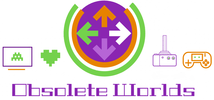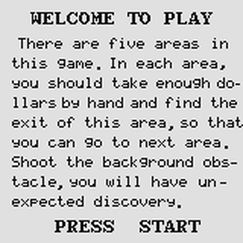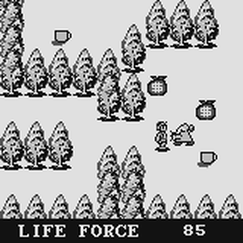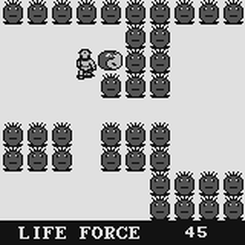REVIEW: Delta Hero
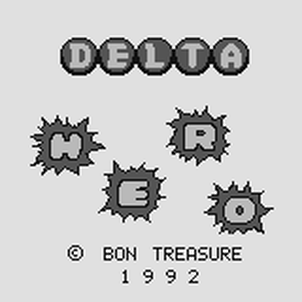
Game Title: Delta Hero
Genre: Action Adventure
System: Watara Supervision
Developer: Bon Treasure
Release date: 1992
Genre: Action Adventure
System: Watara Supervision
Developer: Bon Treasure
Release date: 1992
It can sometimes be difficult to try to understand the mindset of a developer working on Supervision games. Clearly more than one was instructed to produce clones or genre specific titles that would ape the popular titles of the time.
Then you have games like Delta Hero, where the instruction and design brief seems to have involved showing the developer some screenshots of the title that they are aiming for and leaving them to muddle together the results.
Dragon Crystal is one of our all time favourite rogue-likes. A graphically simple top down exploration game for the Sega Game Gear that was perfect for a quick 15 minute session, yet with a randomised quality that has held our interest for over two decades!
Dragon Crystal has also clearly been the graphical inspiration for Delta Hero. Everything from the main sprite, the block like structure of the labyrinths he explores and even many of the items that he collects are rooted in that game’s artistic style. This makes it all the more peculiar that the gameplay is quite different.
The object in Delta Hero isn’t just to locate the exit on each floor (of which there are only five rather than Dragon Crystal’s forty!) and there is also no armour or weaponry to collect or building up of the main character and his stats. Instead it’s a simple find the exit affair, although the twist here is that, in order to leave, the hero must also locate 9 hidden money bags and take them to the exit, represented by a stylized Ying Yan floor tile.
Each stage is a race against time as the hero’s health is constantly depleting. Picking up bread, cups of tea or bottles replenishes this health temporarily. If the game’s status screen is to be believed, then it is also possible for the hero to be poisoned, although I have yet to observe this occur in game.
Then you have games like Delta Hero, where the instruction and design brief seems to have involved showing the developer some screenshots of the title that they are aiming for and leaving them to muddle together the results.
Dragon Crystal is one of our all time favourite rogue-likes. A graphically simple top down exploration game for the Sega Game Gear that was perfect for a quick 15 minute session, yet with a randomised quality that has held our interest for over two decades!
Dragon Crystal has also clearly been the graphical inspiration for Delta Hero. Everything from the main sprite, the block like structure of the labyrinths he explores and even many of the items that he collects are rooted in that game’s artistic style. This makes it all the more peculiar that the gameplay is quite different.
The object in Delta Hero isn’t just to locate the exit on each floor (of which there are only five rather than Dragon Crystal’s forty!) and there is also no armour or weaponry to collect or building up of the main character and his stats. Instead it’s a simple find the exit affair, although the twist here is that, in order to leave, the hero must also locate 9 hidden money bags and take them to the exit, represented by a stylized Ying Yan floor tile.
Each stage is a race against time as the hero’s health is constantly depleting. Picking up bread, cups of tea or bottles replenishes this health temporarily. If the game’s status screen is to be believed, then it is also possible for the hero to be poisoned, although I have yet to observe this occur in game.
|
The in game instructions reveal its relative brevity and simple nature.
|
The player attacks an enemy in stage 1 while life giving cups of tea and money bags sit around waiting to be collected.
|
The player approaches the exit tile of stage 2. However unless he has collected enough money he cannot leave.
|
Unlike Dragon Crystal, where the hero begins each stage in a fog enshrouded maze, the labyrinth in Delta Hero is mostly visible from the outset, although secret entrances can and must be detected by collectin x-ray specs or by noting minor graphical differences (e.g. the faces that make up stage 2’s walls wear a different expression when they can be smashed open). This is achieved by shooting them with the arrows that the hero can fire. Assorted monsters also roam the maze or sit blocking corridors and must be either avoided or dispatched in a similar way to progress.
Running out of health means death for the hero and the game only offers one chance to continue before the ‘Game Over’ screen arrives.
The game’s music is the usual tinny offering from the Supervision and the graphics, which look okay when stationary, unfortunately descend into the familiar motion blurring as soon as the character moves, something that can make navigation a headache.
Delta Hero is something of an oddity. Short and not particularly challenging; in that it could be mapped out by the dedicated player quite easily, as its stages lack the random nature of Dragon Crystal)
With greater length and a password system, or by offering the rogue-like randomisation of levels that its inspiration offered, it could have been one of the Supervision’s best games. Instead it is just a short curiosity, for fans of a much better game. Fun to play for ten minute bursts but feeling more like a tech demo for the game that it could potentially have been.
Score 6/10
Running out of health means death for the hero and the game only offers one chance to continue before the ‘Game Over’ screen arrives.
The game’s music is the usual tinny offering from the Supervision and the graphics, which look okay when stationary, unfortunately descend into the familiar motion blurring as soon as the character moves, something that can make navigation a headache.
Delta Hero is something of an oddity. Short and not particularly challenging; in that it could be mapped out by the dedicated player quite easily, as its stages lack the random nature of Dragon Crystal)
With greater length and a password system, or by offering the rogue-like randomisation of levels that its inspiration offered, it could have been one of the Supervision’s best games. Instead it is just a short curiosity, for fans of a much better game. Fun to play for ten minute bursts but feeling more like a tech demo for the game that it could potentially have been.
Score 6/10
